|
|
|
Sort Order |
|
|
|
Items / Page
|
|
|
|
|
|
|
| Srl | Item |
| 1 |
ID:
088413
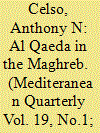

|
|
|
|
|
| Publication |
2008.
|
| Summary/Abstract |
The presence of al Qaeda in the Maghreb (AQIM) may be interpreted as the opening of a new front in the cause of international jihad. However, terrorist activity in North Africa is not new, for the region has been convulsed by past jihadist insurgencies. The essay argues that AQIM is a response to jihadists' post-9/11 organizational and ideological problems. The loss of al Qaeda's Afghan sanctuary had made it dependent on affiliates to recruit terrorists. The failure of the North African Salafists to overthrow any government, moreover, requires the commissioning of a new cause. AQIM is a mutually beneficial arrangement among jihadists to compensate for past failures.
|
|
|
|
|
|
|
|
|
|
|
|
|
|
|
|
| 2 |
ID:
187261
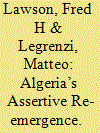

|
|
|
|
|
| Summary/Abstract |
Algeria is re-emerging as an active player in international politics following the Arab Spring uprisings that swept across the Middle East and North Africa beginning in 2010–11. But it has adopted a much different posture from the one it maintained during the 1960s and 1970s. The broadly accommodative attitude that Algiers previously exhibited towards the outside world has been replaced by a more combative stance. Military power has become its primary tool for managing inter-state disputes, and Algeria has stepped up its involvement in the domestic affairs of nearby states. These changes have contributed to the resurgence of conflict in North Africa at a moment when the regional order might well have moved in a more peaceful direction.
|
|
|
|
|
|
|
|
|
|
|
|
|
|
|
|
| 3 |
ID:
163109
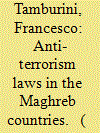

|
|
|
|
|
| Summary/Abstract |
This article sheds light on the counter-terrorism measures enacted by the Maghreb countries, with a comparative approach of the laws in Algeria, Mauritania, Morocco, and Tunisia. Carried out by comparing the Arabic and French original versions, the analysis revealed a common attitude that tended to preserve national security at the expenses of civil freedoms and human rights. In almost all cases, anti-terrorism laws strayed away from their supposed initial finality – fighting terrorism – tackling other issues such as the maintenance of public order or indirectly the control of dissidence and political opposition, with no or scarce legal checks and balances that could restrict possible police or judiciary abuses towards civil and political rights. The legal measures significantly delayed both the first transition to democracy in the region in the 2000s as well as the promising development after the ‘Arab spring’.
|
|
|
|
|
|
|
|
|
|
|
|
|
|
|
|
| 4 |
ID:
182475
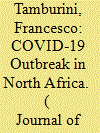

|
|
|
|
|
| Summary/Abstract |
North African nations, especially Egypt, Algeria, and Morocco, have been heavily affected by COVID-19 if compared to other African countries. Governments in North Africa took proactive legal measures to manage the virus threat, safeguarding population health, but also triggering repressive and invasive mechanisms that in some cases jeopardized basic freedoms and rights. This work will analyze comparatively the anti-COVID-19 legislations, pointing out how the legislative measures mirrored the level of transition of democracy, the opacity of some regimes, exploitation of the pandemic to foster repressive control, and highlighting the weakness of new democratic institutions unprepared to balance health security and democracy.
|
|
|
|
|
|
|
|
|
|
|
|
|
|
|
|
| 5 |
ID:
163757
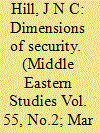

|
|
|
|
|
| Summary/Abstract |
The Arab uprisings’ failure to bring about either the scale or type of political change in the Maghreb that it initially seemed to promise belies the significance of its impact on the region. While Algeria, Mauritania and Morocco continue to be ruled by the same competitive authoritarian regimes that held power when the protests began, they, and the new governments in Tunisia and Libya, must now negotiate an altered and more dangerous security environment than before. The unsettling of Tunisia’s security apparatus and the outbreak of full-blown civil war in Libya have created new opportunities for terror and criminal groups to thrive and expand. The primary aim of this special issue is to chart and explain many of the critical changes in the Maghreb’s security environment that have occurred as a result of the Arab Spring. Each of the articles collected here identifies and analyses at least one important security issue in one or more Maghreb country as well as explain how that issue has emerged in response to or been affected by the Arab Spring.
|
|
|
|
|
|
|
|
|
|
|
|
|
|
|
|
| 6 |
ID:
053475
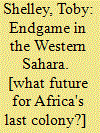

|
|
|
|
|
| Publication |
London, Zed Books, 2004.
|
| Description |
xii, 215p.pbk
|
| Standard Number |
1842773410
|
|
|
|
|
|
|
|
|
|
|
|
Copies: C:1/I:0,R:0,Q:0
Circulation
| Accession# | Call# | Current Location | Status | Policy | Location |
| 048535 | 964.8053/SHE 048535 | Main | On Shelf | General | |
|
|
|
|
| 7 |
ID:
108670
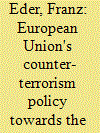

|
|
|
|
|
| Publication |
2011.
|
| Summary/Abstract |
This article sheds light on the European Union's counter-terrorism policy in the Maghreb taking into account the diverse influences and interests shaping its strategic thinking. To explain the complex web of opportunities and constraints, the article refers to Terry Deibel's framework for the analysis of foreign and security affairs. The author concludes that the Union's counter-terrorism policy in the Maghreb has been shaped more by the desire for regional stability and greater trade relations and energy security than by the goal of promoting democratic values and human rights. Moreover, the promotion of democracy is perceived by EU policy-makers as a destabilising factor that could endanger counter-terrorism efforts.
|
|
|
|
|
|
|
|
|
|
|
|
|
|
|
|
| 8 |
ID:
133542
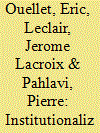

|
|
|
|
|
| Publication |
2014.
|
| Summary/Abstract |
A number of observers have expressed serious concerns that Al-Qaeda in the Islamic Maghreb (AQMI), as it expands in the Sahel, may become strong enough to be a threat to Europe and carry on the global mission of Al-Qaeda as conceived by bin Laden. This fear seems unwarranted. Using institutional analysis to study the AQMI behavioral fluctuations over the last decade, this article argues that AQMI's need to find a compromise between external and internal legitimacy has constrained its behavior. The affiliation of the Algerian terrorists with Al-Qaeda was in many ways a marriage of convenience that created a number of internal contradictions. At the cognitive level, implicit Algerian nationalism to rid the country of its corrupt regime remains at odds with pan-Islamic views shared by Al-Qaeda's leadership. At the normative level, indiscriminate suicide bombing supported by Al-Qaeda is abhorrent to many Algerian terrorists, who construe their mandate in the spirit of the Algerian war of independence where it is their duty to protect civilians. These and other contradictions prevent AQMI from developing a coherent political agenda and thus it is less likely to engage in a long-term conflict against European societies.
|
|
|
|
|
|
|
|
|
|
|
|
|
|
|
|
| 9 |
ID:
172346
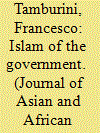

|
|
|
|
|
| Summary/Abstract |
Islam, in its relation between state and politics, has often been used to strengthen the sense of national identity or as a tool of self-legitimation by Arab regimes to gain the support of the people. This happened in Algeria, Morocco, Mauritania and Tunisia, where the state not only co-opted religion for official purposes but absorbed the ‘ulamā’, the religious establishment, in the administration as simple employees of newly created institutions, such as the High Islamic Councils. This article aims to shed light on these little-known organizations, one of the regime’s keystones to having a firm hold on their power.
|
|
|
|
|
|
|
|
|
|
|
|
|
|
|
|
| 10 |
ID:
106666
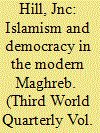

|
|
|
|
|
| Publication |
2011.
|
| Summary/Abstract |
This paper examines the legitimacy of the restrictions the Moroccan and Algerian governments have placed on democracy in their countries. In each case the democratic process is subject to a range of limitations. These controls are justified on the grounds that they help prevent Islamist parties from winning power and that, if in government, these parties would roll back many of the political and civil rights enjoyed by Moroccan and Algerian citizens. Yet is this the case? By looking at the pjd's and msp's manifesto pledges from the most recent parliamentary elections, the paper uncovers a different attitude. Far from opposing democracy and the various rights and liberties commonly associated with it, the pjd and msp are working to strengthen it. Their commitment to democracy has grown, not diminished, over the past decade.
|
|
|
|
|
|
|
|
|
|
|
|
|
|
|
|
| 11 |
ID:
163254
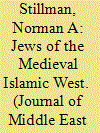

|
|
|
|
|
| Summary/Abstract |
Jews constituted a significant element in the population of the medieval Muslim West, which in the Middle Ages included much of Spain as well as North Africa. They became linguistically arabized by the tenth century and adopted many elements of Islamic general culture. There were, however, limitations—both self-made and imposed by the dominant society. This article discusses the areas of contact and integration they had with Islamic culture, on the one hand, and boundaries of separation and differentiation, on the other.
|
|
|
|
|
|
|
|
|
|
|
|
|
|
|
|
| 12 |
ID:
007684
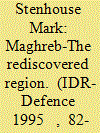

|
|
|
| 13 |
ID:
091822
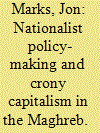

|
|
|
|
|
| Publication |
2009.
|
| Summary/Abstract |
Twenty years on from the Arab Maghreb Union (UMA)'s creation, the European Community, which encouraged the move, has long evolved into the European Union, including old eastern European members which two decades ago seemed to be behind many UMA members in their potential to suck in Financial Direct Investment. While North African economies have continued to make significant progress, their structures and practices have not evolved nearly as quickly as seemed likely two decades ago. This article focuses on the political economy aspects of North Africa's perceived problems of drawing in investment and promoting regional integration: the domestic politics of the Euro-Med's Maghrebi partners, not only in the sense that 'nationalist' policy-making has a major impact on economic outcomes but also in the prevalence of crony capitalism across the region.
|
|
|
|
|
|
|
|
|
|
|
|
|
|
|
|
| 14 |
ID:
130218
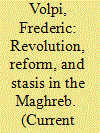

|
|
|
|
|
| Publication |
2014.
|
| Summary/Abstract |
The political situation in the Maghreb in the first decade of the twenty-first century presented a vivid image of enforced stability under authoritarian regimes that gave hardly any hint of changing in the short to medium term. The Moroccan monarchy had successfully engineered a fragmented and ineffective political system that was not posing any concrete challenge to its rule. The military-backed Algerian regime had restored the effectiveness of its institutional apparatus through a combination of repression, diversion of oil rents, and divide-and-rule political tactics. The regime of President Zine el-Abidine Ben Ali in Tunisia had effectively turned into a police state that did not let any kind of organized opposition challenge the established authoritarian "pact." (In Tunisia, this implicit understanding amounted to stability, provision of state services, and opportunities for personal advancement in exchange for political quiescence.)
|
|
|
|
|
|
|
|
|
|
|
|
|
|
|
|
| 15 |
ID:
168248
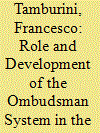

|
|
|
|
|
| Summary/Abstract |
The institution of the Ombudsman is aimed at defending values such as human rights and the respect for the rule of law against any form of abuse or arbitrariness. Many academic studies have been devoted to the Ombudsman in its different developments around the world, but not to the Maghreb area. This article wants to shed light on the characteristics of the Ombudsman in Algeria, Mauritania, Morocco and Tunisia. The comparative exam of the different North African Ombudsmen will point out how the institution was able to survive only in states where a transition to democracy was truly in place.
|
|
|
|
|
|
|
|
|
|
|
|
|
|
|
|
| 16 |
ID:
180690
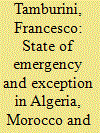

|
|
|
|
|
| Summary/Abstract |
This paper shows how the constitutional provisions related to the state of emergency and exception, although they are contained within democratic traditions, were set to operate in Algeria, Morocco and Tunisia as a mechanism of basic control and maintenance of liberal autocracies. The state of emergency model was used for the survival of regimes in times of instability and social unrest, leading in some cases to the suspension of human rights for many years. Nevertheless, these provisions were modified or lifted when the regime had to show a more convincing stake to the democratic process in 2011.
|
|
|
|
|
|
|
|
|
|
|
|
|
|
|
|
| 17 |
ID:
091824
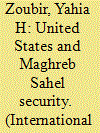

|
|
|
|
|
| Publication |
2009.
|
| Summary/Abstract |
Although the Maghreb has never been a priority, it now represents a region of significant interest for the United States. The importance of the Maghreb, and its Sahel extension, springs first from political and economic/energy interests, and second, from military, strategic and security concerns. The first relates to America's energy needs in the region, as well as to the regionalization that could create a potentially lucrative market for US businesses, especially since competition with China has increased over its recent gains in Africa. The second motivation, linked to the first, stems from Washington's new strategy and security policies initiated since 9/11 which have heightened the need for a new type of management concerning security, Islamism, terrorism, and, for a time, democratization. Unquestionably, the problems of terrorism, illegal migration, and other illegal activities are symptoms which cannot be understood if they are disconnected from their causes. However, rather than promoting economic development and good governance, the United States has focused predominantly on hard security matters and established a security system in the region which has continued under the Obama administration. Furthermore, Washington has not so far distanced itself from the regimes in the region whose authoritarianism, mismanagement of the economy, and violation of civil liberties is precisely what brought about the ills from which the Maghreb-Sahel suffers. Without addressing these issues therefore, there is little chance that the region will witness long-lasting peace, security, and prosperity. Furthermore, the protracted conflict in the Western Sahara, the resolution of which has been impeded by the geopolitical considerations of outside powers, has not only hindered the necessary construction of an integrated Maghreb, but also has the potential of leading to regional conflict.
|
|
|
|
|
|
|
|
|
|
|
|
|
|
|
|
| 18 |
ID:
116660
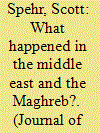

|
|
|
|
|
|
|
|